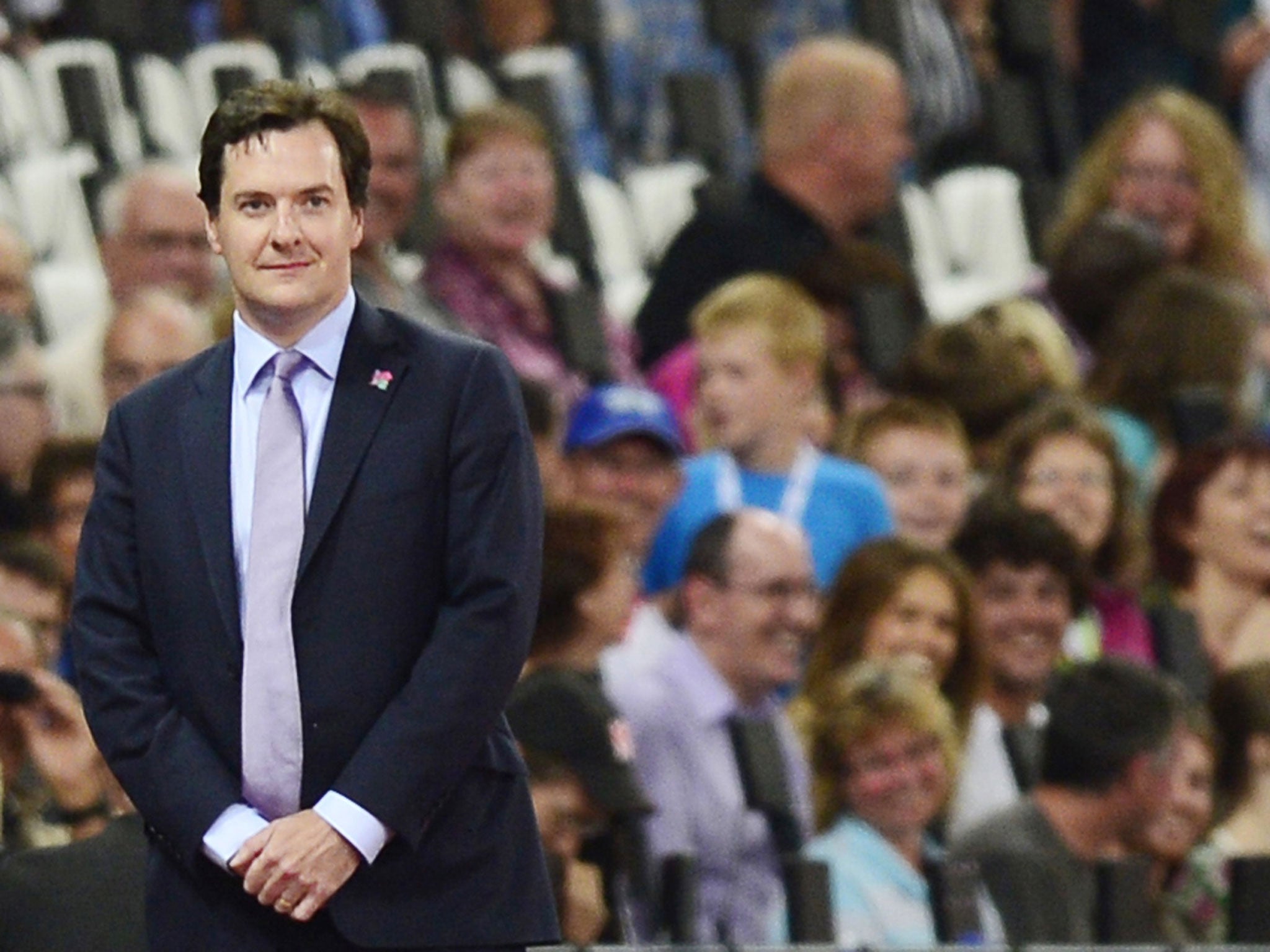Why Mr Osborne isn’t blowing his own trumpet – at least not until 2015
Inside Westminster: Voters might think it's safe to take a chance on Labour in 2015 if they think the job is done

Today’s good GDP figures mark another stage in the rehabilitation of George Osborne. His allies on the Conservative benches, several of whom were promoted in David Cameron’s recent reshuffle, believe he is quietly re-emerging as a contender in the future Tory leadership stakes.
The Chancellor’s comeback from the nadir of his “omnishambles Budget” last year is remarkable. But he will not overblow his own trumpet. It is not in his interests. Although he would argue he has proved his Labour critics wrong, there is a still a legitimate criticism that his spending cuts delayed the recovery. Yet there is not much point in Labour banging on about “three wasted years” since elections are usually about the future. Labour’s fear is that the Conservatives get a grudging respect from voters that the pain was just about worth it, because the deficit had to be sorted.
The Chancellor also knows it would be unwise to trumpet the recovery when there is no “feel-good factor” in most of the country. That would merely reinforce another barrier to him succeeding David Cameron – his image as a “posh boy” out of touch with the real world.
His image problem was shown when he was booed at the Paralympic Games, a highly symbolic contrast with the man who may turn out to be his biggest rival for the Tory crown, Boris Johnson.
Politically, too, it suits Mr Osborne to say the economy is “on the mend” rather than healed; voters might think it safe to take a chance on Labour in 2015 if they believe the job is done. So the Chancellor will tell us repeatedly that more spending cuts are needed after the next election (and challenge Labour to match them). Tax cuts, the reward for the years of austerity, will have to wait, although they will be dangled in the Tory manifesto.
Of course, Mr Osborne’s leadership prospects will depend on the unpredictable circumstances of Mr Cameron’s departure. If the Tories lose power in 2015, the Chancellor’s hopes would fade, since he would be the architect of the economic strategy and two election campaigns that failed to deliver a majority.
But if they retain office, Mr Cameron would be in a position to fix a Downing Street departure timetable that suited Mr Osborne, his closest political ally. There would be several other contenders, not least Theresa May, the Home Secretary, who is slowly but surely gathering backbench support. But Mr Osborne is back in the game.
Another sign of his power emerged this week when Mr Cameron rushed out a promise to “roll back” the green taxes included in energy bills. Although both men would deny it, this was a victory for the Chancellor over the Prime Minister. Mr Osborne has been trying to wean Mr Cameron off the green agenda he embraced in sunnier economic times in opposition.
Mr Cameron, who hates being accused of a U-turn more than anything, preferred ensuring customers are on the lowest tariff to cutting green taxes.
But Mr Miliband’s call for a temporary price freeze and Sir John Major’s proposal for a windfall tax on the energy firms pushed the Prime Minister into the Chancellor’s camp, albeit in a panic move. It was a big moment. From now on, it’s “vote blue, go blue” (not green) if you back the Tories.
The Tories’ biggest challenge is to answer Labour’s charge that the “cost of living” crisis shows the recovery is not “fair”. In opposition, Mr Cameron and Mr Osborne coined the phrase “sharing the proceeds of growth” between public services and tax cuts. It was designed to tackle the voters’ lack of trust in the Tories on public services. People liked their individual policies, but not when they were told they were those of the Tories.
Now the Prime Minister and Chancellor need to revive their slogan with a new meaning: everyone will share the benefits of the recovery. They hope that Labour now suffers the same “brand contamination” that plagued the Tories in opposition. Tory polling suggests that, while Mr Miliband’s energy price freeze is highly popular, the public don’t believe he would deliver it because they don’t trust Labour on the economy.
This might explain why, even though Mr Miliband has made the political weather in the five weeks since announcing his policy, Labour’s poll lead has narrowed rather than widened as the economy recovers.
If that’s right, it would be bad news for Labour and good for Mr Osborne’s career prospects. But Labour insists its support has hardened in recent weeks and the “bullseye” on energy prices has addressed one of its weaknesses – Mr Miliband, whose personal ratings are much better.
The two parties mirror each other on the two big issues of our time: Labour is ahead on living costs, the Tories on general economic competence. Mr Miliband will now try to convince us that his measures to cut the cost of living will not harm the economy. The party that can best reassure voters on both fronts will be in power after the next election.
Subscribe to Independent Premium to bookmark this article
Want to bookmark your favourite articles and stories to read or reference later? Start your Independent Premium subscription today.

Join our commenting forum
Join thought-provoking conversations, follow other Independent readers and see their replies